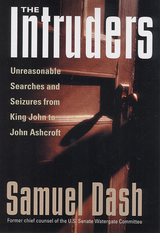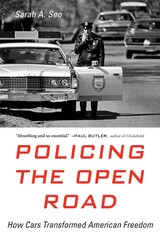
What led to the Fourth Amendment’s protection of the people against unreasonable searches and seizures, codified in written law for the first time in history, and are we in danger of losing that protection? Celebrated lawyer Samuel Dash, known for his role as Chief Counsel of the Watergate Committee, explores the struggle for privacy. He does so by telling the dramatic tales of the people who were involved in influential legal battles, including landmark Supreme Court cases.
Covering almost eight-hundred years of history, Dash begins with the time of King John of England and the Magna Carta, then moves to colonial America as colonists resisted searches mandated under King George. These tensions contributed to the birth of the United States and the adoption of our Bill of Rights with its Fourth Amendment, protecting people against unreasonable searches and seizures.
How effective that protection has been is the story of the next two centuries. Dash explores U.S. Supreme Court cases through the sometimes humorous experiences of the people involved, including the unlucky gambler with a shoplifting wife and the police lieutenant turned king of bootleggers. To some extent, judicial safeguarding of Fourth Amendment protections depended on who made up the majority of the Court at any given time.
By 2001 a conservative majority of the Court had given law enforcement agents greater search powers than ever before. Dash challenges the legal justification of the Bush Administration’s grab for greater search, seizure, and wiretap powers after the 9/11 terrorists’ attacks. He reminds us of government abuses of power in prior emergencies in American history. For Dash, the best security is our belief in individual liberty and the enforcement of our Bill of Rights.

A Smithsonian Best History Book of the Year
Winner of the Littleton-Griswold Prize
Winner of the Ralph Waldo Emerson Award
Winner of the Order of the Coif Award
Winner of the Sidney M. Edelstein Prize
Winner of the David J. Langum Sr. Prize in American Legal History
Winner of the Berkshire Conference of Women Historians Book Prize
“From traffic stops to parking tickets, Seo traces the history of cars alongside the history of crime and discovers that the two are inextricably linked.”
—Smithsonian
When Americans think of freedom, they often picture the open road. Yet nowhere are we more likely to encounter the long arm of the law than in our cars. Sarah Seo reveals how the rise of the automobile led us to accept—and expect—pervasive police power, a radical transformation with far-reaching consequences.
Before the twentieth century, most Americans rarely came into contact with police officers. But in a society dependent on cars, everyone—law-breaking and law-abiding alike—is subject to discretionary policing. Seo challenges prevailing interpretations of the Warren Court’s due process revolution and argues that the Supreme Court’s efforts to protect Americans did more to accommodate than limit police intervention. Policing the Open Road shows how the new procedures sanctioned discrimination by officers, and ultimately undermined the nation’s commitment to equal protection before the law.
“With insights ranging from the joy of the open road to the indignities—and worse—of ‘driving while black,’ Sarah Seo makes the case that the ‘law of the car’ has eroded our rights to privacy and equal justice…Absorbing and so essential.”
—Paul Butler, author of Chokehold
“A fascinating examination of how the automobile reconfigured American life, not just in terms of suburbanization and infrastructure but with regard to deeply ingrained notions of freedom and personal identity.”
—Hua Hsu, New Yorker
READERS
Browse our collection.
PUBLISHERS
See BiblioVault's publisher services.
STUDENT SERVICES
Files for college accessibility offices.
UChicago Accessibility Resources
home | accessibility | search | about | contact us
BiblioVault ® 2001 - 2024
The University of Chicago Press









